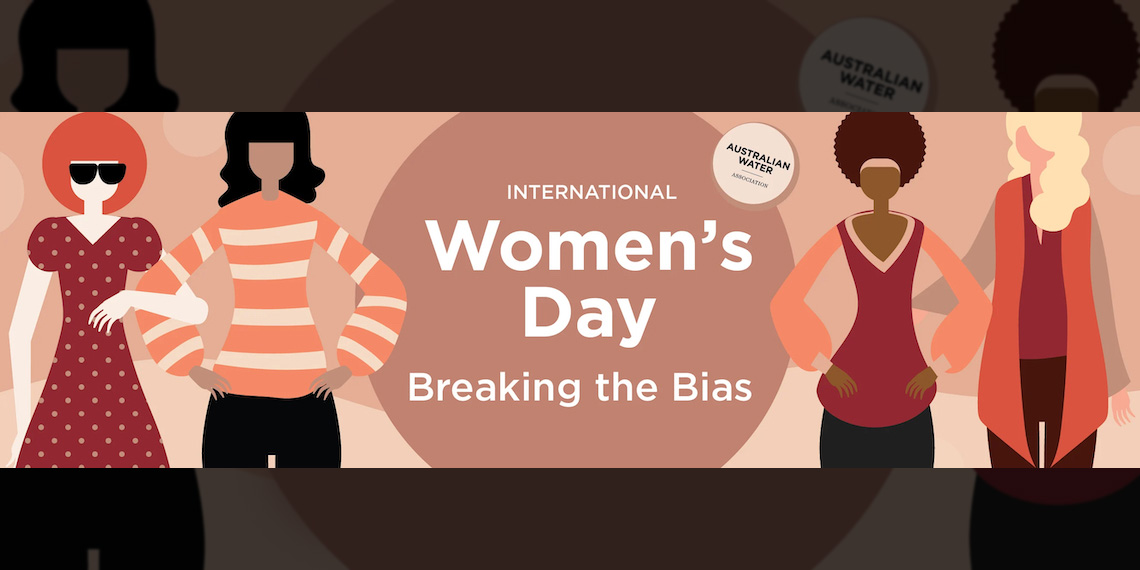Embracing diversity and inclusion this International Women's Day

The water sector is facing some big challenges — the continued pandemic, mitigating the impacts of climate change, transitioning to net zero. The genuine inclusion of diverse perspectives is crucial to ensuring solutions and decision-making lead to equitable and resilient outcomes.
The theme of this year’s International Women’s Day (8 March) is "Breaking the Bias", and Melbourne Water and AWA VIC will be hosting a free webinar that explores the theme with Dr Helen Szoke and Dr Nerina Di Lorenzo as panellists.
We spoke with Szoke and Yarra Valley Water Aboriginal Partnerships Manager Nina Braid around a number of important issues ahead of the day.
Szoke said this year’s International Women’s Day theme points towards the continued need to do better when it comes to inclusivity — and the need to do better now.
“We can’t keep messing around with this. In terms of Western countries, Australia is not tracking well in terms of the representation of women at all levels of decision making, in the political sphere and within a whole range of sectors,” she said.
“There’s now plenty of research that suggests the more diverse the people sitting around the table, the broader and deeper the ideas that come from that group are going to be. The evidence is in, diversification is critical.
“It’s even more critical when you think about the incredible challenges that face us all at the moment. Certainly for the water sector, climate change is going to be a major challenge.
“We need to address the structural challenges involved in achieving diversity, and really take them on.”
Diversity and inclusion are integral to genuinely and equitably meet the needs of our communities, Braid said.
“We need to think about whether our organisations represent the communities we serve. We need to make sure we understand the person on the other end of the tap and what their needs are,” she said.
“Having a diverse and inclusive workforce also pushes the spread of sexism and racism out the door. If you have a diverse culture and talk about being diverse, there really is no room for discrimination.”
Challenging cultures
Braid said one of the most important challenges in supporting diversity is to ensure people of all cultures and genders feel safe within the workplace — and this means feeling safe enough to call out that someone’s behaviour is inappropriate.
“People need to feel safe enough to speak up when someone makes them feel as though they don’t want to work for that company anymore,” she said.
While the water sector is progressing pretty well with gender diversity, Braid said Aboriginal employment still needs more attention.
“We need to start getting ahead with the things we can do, rather than set them aside because they are difficult to implement. Not knowing how to do something should not be an excuse, we have plenty of tools and insights to achieve this,” she said.
Furthermore, Braid said every segment of the water sector needs to get a lot better at showcasing the water sector as a safe place to work, and as a fulfilling place to work.
“As an industry, we don’t promote that we are a safe employer. We need to go out to community and talk to people and celebrate working in water,” she said.
“The water sector presents an opportunity for Aboriginal people to continue their obligations to Country. We need to create a safe work environment that embraces people caring for Country.
“We need to do it, we need to be more sustainable, and we need to make sure that we look after Country so that it looks after us.”
According to Szoke, the cultural transitions that need to occur to ensure genuine diversity are the biggest challenge, with the focus needing to be on how to become truly inclusive, starting with recruiting.
“How do we make sure that once we get people through the door, they want to be a part of our organisation?” she said.
“There is still a high level of self selection out of particular roles because people don’t feel they would be taken seriously, so why bother. We need to look at how we recruit, and think differently about how we do it. We need to offer value propositions that go beyond the normalised avenues.
“The water sector is doing very well around gender balance, but if our selection panels aren't diverse, we need to diversify them.
“There are plenty of people that would be happy to sit on a selection panel as a First Nations person, or a person of colour or of disability, that can help panels consider the potential of a group of diverse applicants.”
Working towards better
When it comes to opportunities, Szoke said the pandemic has taught us a few things about how we can pragmatically support and care for our staff.
“We are still in the midst of pandemic mode, and we need to be asking how this has impacted on workplaces, and what are the good things that we can continue to progress that will encourage diversification,” she said.
“Flexibility is one example. Working from home, I am sure, was a double-edged sword for a lot of us. Notwithstanding that, we’ve shown that we can work in multiple settings. And that productivity doesn't necessarily have to be diminished when working remotely.
“What have we been doing that has helped our staff have easier access to flexible work arrangements? Can we continue to utilise these things to ensure that we get diversification?”
What’s more, allowing flexibility is important when considering how to support cultural inclusivity, allowing for employees to fulfil their cultural and community obligations, Braid said.
“Policies around parental leave, sorry business leave, and cultural leave to attend community events removes the barrier for people who need or want to participate in their community,” she said.
“We want people to be able to fulfil their cultural obligations, and acknowledge that the time people need for cultural events or sorry business will vary, depending on where they are from.”
Breaking the bias is about removing barriers so that everyone can come together as equals.
“It’s about ensuring we allow all the women we have in the workforce to continue to be mothers, sisters, aunties, as well as staff members,” Braid said.

